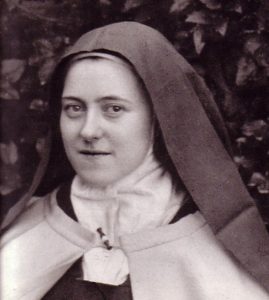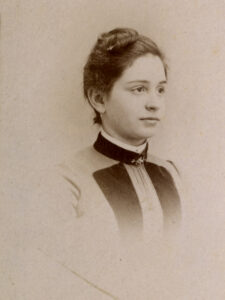Podcast: Play in new window | Download (Duration: 35:35 — 24.5MB) | Embed
Subscribe: Apple Podcasts | Spotify | Amazon Music | Android | Pandora | iHeartRadio | JioSaavn | Podchaser | Gaana | Podcast Index | Email | TuneIn | Deezer | Anghami | RSS | More

Caverns of Longing within the Soul – St. John of the Cross: Master of Contemplation with Fr. Donald Haggerty
Fr. Donald Haggerty and Kris McGregor discuss how St. John of the Cross’ writings arose in response to requests for guidance and making his teachings accessible not only to Carmelites but to all who seek a deeper union with God. St. John’s works, including his aphorisms and treatises, provide a roadmap for spiritual growth, focusing on self-denial, the theological virtues, and contemplative prayer.
St. John’s insights on faith, hope, and charity transcend academic theology, revealing how these virtues open “caverns” within the soul for God’s indwelling presence. This process leads to a transformation where one’s love for God becomes the central axis of their life. There is a universal nature to St. John’s spirituality, which addresses modern challenges of distraction and misplaced desires.
Discerning Hearts Reflection Questions
- St. John’s Universal Call to Holiness
How can you apply St. John of the Cross’s teachings on the universal call to holiness in your own daily life and prayer? - Theological Virtues and Union with God
In what ways can you nurture faith, hope, and charity to deepen your union with God? - Caverns of Longing in the Soul
What steps can you take to empty yourself of attachments that hinder God’s presence in your life? - God’s Initiative in Prayer
How can you become more receptive to God’s action and presence in your prayer life instead of relying solely on your own efforts? - Love and Detachment
How does loving God as your primary relationship transform your other affections and priorities? - Scriptural Reflection
How do the Last Supper discourses in the Gospel of John inspire you to trust in Jesus’ promise of indwelling love and presence? - Poetry and Mysticism
How might reading St. John’s poetry or aphorisms inspire you to explore the mystery of God’s love more deeply? - Spiritual Direction and Guidance
What role does spiritual direction or the writings of the saints play in helping you navigate challenges in your spiritual journey? - Courage in Faith
What aspects of Nicodemus and Joseph of Arimathea’s faith journey resonate with your own struggles to trust God in new ways? - Contemplative Prayer for Modern Life
How can you create space in your life for contemplative prayer amid the distractions and demands of the modern world?
“We encounter the importance of seeking a contentment with nothing other than God in many places in Saint John of the Cross’ writings. Shortly after introducing the image of the faculties as “deep caverns of feeling” in The Living Flame of Love, for instance, he affirms that a primary impediment to contemplation occurs when attachments cling to us and are repeatedly sought instead of our seeking God himself. These attachments are always contrary to accepting a contentment with having nothing: “Any little thing that adheres to them in this life is sufficient to so burden and bewitch them that they do not perceive the harm or note the lack of their immense goods, or know their own capacity” (LF 3.18). The words are a strong admonition. It takes very little to upset and block the proper dynamism of a holy pursuit of God in or out of the life of prayer. We can end up living unaware of the harm inflicted by very common tendencies that, in effect, keep us from being content with having nothing, that is, nothing but God. We have a capacity for greatness, for being filled with the love of God in our prayer. Yet we may live our hours of prayer like restless marauders in a search for prizes or enjoyments worth very little, seeking for delights that satisfy us only in negligible and fleeting ways. Without an awakening by which God becomes a passionate pursuit engaging our life’s entire intensity, our soul can descend easily to a dull caricature of its actual potency. As Saint John of the Cross writes:
It is an amazing thing that the least of these goods is enough so to encumber these faculties, capable of infinite goods, that they cannot receive these infinite goods until they are completely empty, as we shall see. Yet when these caverns are empty and pure, the thirst, hunger, and yearning of the spiritual feeling is intolerable. Since these caverns have deep stomachs, they suffer profoundly; for the food they lack, which as I say is God, is also profound. (LF 3.18)”
Haggerty, Donald. Saint John of the Cross: Master of Contemplation (pp. 48-49). Ignatius Press. Kindle Edition.



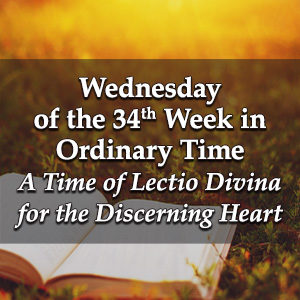 Wednesday of the Thirty-Fourth Week in Ordinary Time – A Time of Lectio Divina for the Discerning Heart Podcast
Wednesday of the Thirty-Fourth Week in Ordinary Time – A Time of Lectio Divina for the Discerning Heart Podcast

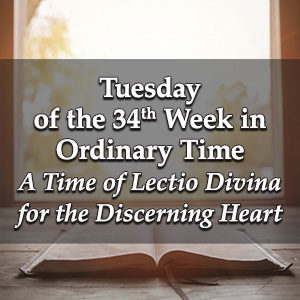 Tuesday of the Thirty-Fourth Week in Ordinary Time – A Time of Lectio Divina for the Discerning Heart Podcast
Tuesday of the Thirty-Fourth Week in Ordinary Time – A Time of Lectio Divina for the Discerning Heart Podcast


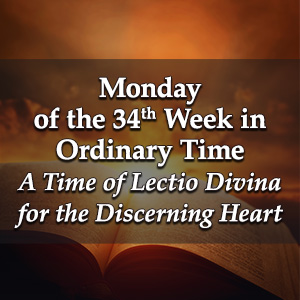 Monday of the Thirty-Fourth Week in Ordinary Time – A Time of Lectio Divina for the Discerning Heart Podcast
Monday of the Thirty-Fourth Week in Ordinary Time – A Time of Lectio Divina for the Discerning Heart Podcast
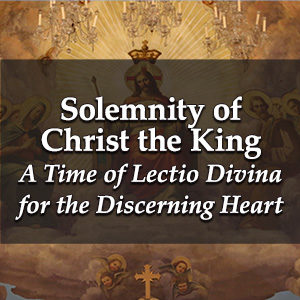 Solemnity of Christ the King – A Time of Lectio Divina for the Discerning Heart Podcast
Solemnity of Christ the King – A Time of Lectio Divina for the Discerning Heart Podcast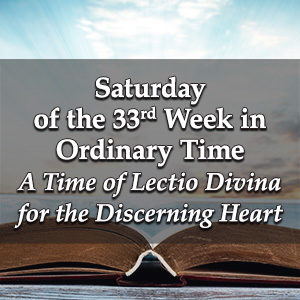 Saturday of the Thirty-Third Week in Ordinary Time – A Time of Lectio Divina for the Discerning Heart Podcast
Saturday of the Thirty-Third Week in Ordinary Time – A Time of Lectio Divina for the Discerning Heart Podcast
